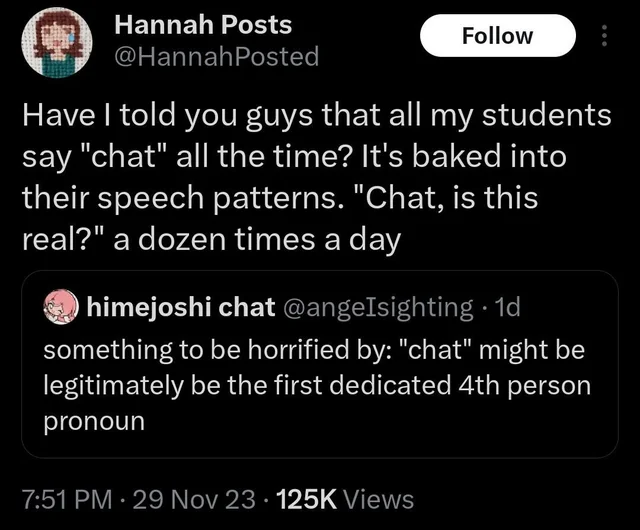this post was submitted on 21 Dec 2023
776 points (95.6% liked)
People Twitter
5974 readers
2273 users here now
People tweeting stuff. We allow tweets from anyone.
RULES:
- Mark NSFW content.
- No doxxing people.
- Must be a pic of the tweet or similar. No direct links to the tweet.
- No bullying or international politcs
- Be excellent to each other.
- Provide an archived link to the tweet (or similar) being shown if it's a major figure or a politician.
founded 2 years ago
MODERATORS
you are viewing a single comment's thread
view the rest of the comments
view the rest of the comments

It speaks to a person that isn't physically present and just an observer. "You" typically addresses someone directly, but can be used to break the 4th wall and talk to observers. "Chat" is exclusively for breaking the 4th wall.
Nah, "chat" is talking to a specific, present group of people, and is used in lieu of writing a text chat. It's not like a film actor speaking to the audience, who has no way of responding. Even so, any terms used in breaking the fourth wall would still be second person, ability to respond and presence aren't a requirement here (e.g. you'd use "you" in letters, and the reader is absolutely not present).
Chat, I've found more youthspeak that I can use incorrectly and be cringe.
Skibidi!
How do you do, fellow kids?
I'm down, I've got the 411, and you are not going out and getting jiggy with some boy, I don't care how dope his ride is.
Ski-bi-dibby-dib yo-da-dub-dub, yo-da- dub-dub
You are wrong on both counts.
I just addressed "you", even though you're not physically present, so clearly that's not a requirement of second person usage, not to mention that presumably this child saying "chat" is being heard by people physically nearby in this example.
In order to break the fourth wall, the speaker must be part of the media. In the instance of streamers talking to their fans, it's clearly meant to be an interactive experience between streamer and host, consuming the same media (albeit in different ways). They're asking a question and getting a response which informs their actions.
Fundamentally, it's no different than when my wife asks "did that wizard just cast fireball?" while she sits on the couch watching me playing Skyrim.
https://www.youtube.com/watch?v=-QPJoRWz8Sc
I don't think it's accurate to call the barrier between a streamer and their audience "the fourth wall". The fourth wall is a concept that exists in theater, and then more largely in fiction, where characters exist in a world where they do not know that they're characters in a story. And the fourth wall breaks when they realize that they are.
If "chat" breaks the fourth wall, then self-help books that use "you" are too, or news anchors addressing their viewers, or politicians saying "my fellow countrymen" in a broadcast address.
Now that is an interesting distinction to make. I suppose that the 4th wall didn't exist throughout most of history (with the exception of theatre) and so there wasn't much reason for this feature of language to develop
There used to also be "dear reader" in books, when the reader was being addressed.
In this regard that would rather be 2.5 plural, kind of present, but kind of not